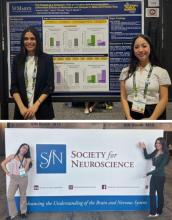
Brayan Ruiz Lopez ’24 completed a nine-week neuroscience internship program at the Princeton Neuroscience Institute at Princeton University this summer. “It was a fantastic experience,” he said. “I got the opportunity to engage in cutting-edge research and connect with like-minded individuals from all across the country.”
The program is part of The Leadership Alliance, whose mission is to leverage its collective resources to address the shortage of individuals from historically underrepresented groups in doctoral training programs, academia and the broader research workforce. Brayan learned about the opportunity from Sarah Latchney, assistant professor of biology and neuroscience and Ruiz Lopez’s research mentor. He applied (along with 1400 others) and was one of 11 admitted to the program.
He joined Professor Elizabeth Gould's lab in Princeton and studied social memory and novelty preference in mice lacking their SHANK3B gene, the genetic cause of Phelan-McDermid syndrome. Common characteristics of Phelan-McDermid syndrome are autistic-like traits like the inability to recognize familiar faces or voices. They confirmed that the mice that lacked this gene were impaired throughout life as they were incapable of recognizing a mouse they had seen before. “This is important to study because social memory allows us to make important decisions in our everyday lives, such as caregiving or our social role in society,” he mentioned.
Ruiz Lopez and his colleagues were curious about what brain regions were responsible for this impairment in behavior. They looked at the Hippocampal region CA2 because the literature describes it as the “social memory hub” of the brain. They found that this region had more perineuronal nets (PNNs) than normal healthy mice. PNNs are structures that surround the cells and limit plasticity but also guide some of the connections in the brain. They performed brain surgery on mice pups (10 days old) that were born with the impairment, to inject them with an enzyme that degrades these perineuronal nets and allows more brain plasticity throughout development. The surgeries enabled the mice to grow into fully functional adults with no social memory impairments.
At the end of the program, he and his colleagues traveled to a national research conference in Connecticut to present their research alongside other interns from other institutions of The Leadership Alliance.
Ruiz Lopez plans to pursue a PhD in neuroscience and research how different brain regions form their connections so that he can use this knowledge to provide treatments of dysregulated brain pathways in neurological conditions such as Alzheimer's disease or epilepsy.



